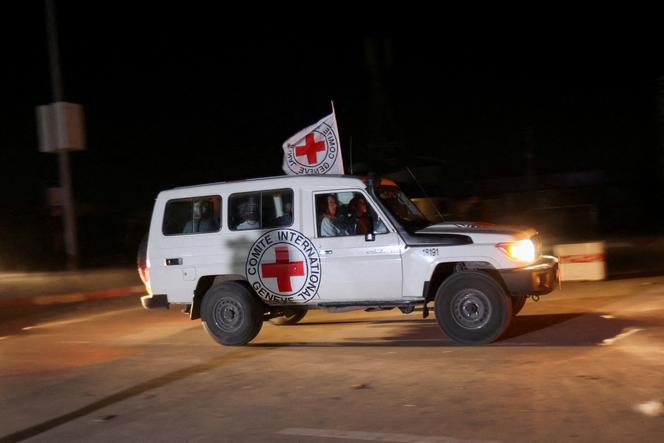


Hamas on Friday, November 24, released a group of hostages held captive in Gaza for weeks, including 13 Israelis, according to officials from Hamas and Israel, the first stage in a swap for Palestinian prisoners in Israel under a four-day cease-fire deal.
The Red Cross said it began a multi-day operation to reunite hostages and detainees with their families in Israel and the occupied Palestinian territories. "We are relieved to confirm the safe release of 24 hostages. We have facilitated this release by transporting them from Gaza to the Rafah border, marking the real-life impact of our role as a neutral intermediary between the parties," the ICRC said in a post on X.
Qatar, which played a key role in brokering the deal, confirmed the hostages released by Hamas are 13 Israelis, 10 Thais and one Filipino.
During the four-day truce, at least 50 hostages are expected to be freed, leaving an estimated 190 in the hands of Palestinian militants. In exchange, 150 Palestinian prisoners are expected to be released.
The pause in fighting triggered a mass movement of thousands of Gazans who had sought refuge in schools and hospitals from relentless Israeli bombardment begun after the October 7 attacks by Hamas. In Khan Yunis, in southern Gaza where many Palestinians fled, a cacophony of car horns and ambulance sirens has replaced the sound of war. Gazans have struggled to survive with shortages of water and other essentials. Trucks carrying more aid, including fuel, gas, and food, began moving into Gaza from the Rafah crossing with Egypt shortly after the truce began at 7:00 am.
Jens Laerke, spokesman for the United Nations humanitarian agency, OCHA, expressed hope in Geneva that the pause "leads to a longer-term humanitarian ceasefire for the benefit of the people of Gaza, Israel and beyond." He repeated the need for access across Gaza, especially in the north "where the damage and the humanitarian needs are the greatest."
On Friday morning, a few apparent gunshots could be heard and dark plumes of smoke rose periodically over northern Gaza, an AFPTV livecam showed, but the truce appeared to be holding in the afternoon. Further north, on the Lebanon-Israel border, calm also returned after regular deadly exchanges of fire, primarily between the Israeli army and Hezbollah. The Lebanese movement, like Hamas, is backed by Iran.
Ziv Agmon, legal adviser to Israeli Prime Minister Benjamin Netanyahu's office, told reporters that the hostages would be received individually or in groups by the International Committee of the Red Cross, taken across the border and handed to the Israeli army. From El-Arish, in the Sinai, they would be flown to Israel, an Egyptian security source said.
The Israeli soldiers had been carefully prepared to receive potentially deeply traumatized women and children. After medical examinations, the former captives will be able to telephone family members before reunions later at Israeli medical facilities, Agmon added. Netanyahu's office said it had received "a first list of names" of those due to be released and been in contact with the families.
Palestinian prisoners held in Israeli jails will also be freed on Friday, Qatari foreign ministry spokesperson Majed Al Ansari said. The Palestinian Authority's prisoner commission published a list of named Palestinian inmates – 24 women and 15 children – who could be released in exchange for the initial hostages.
Hamas earlier released four women and Israeli forces rescued another. Two other captives, including a woman soldier, were found dead by Israeli troops in Gaza.
Earlier, Thailand's Prime Minister Srettha Thavisin had said 12 Thai hostages, in addition to the 13 Israelis, would be released, but only 10 were. Last week, a member of Thailand's hostage release negotiation team said his government had been given assurances by Hamas that the kingdom's nationals held hostage by the armed group were "safe." Earlier this month, the Thai foreign minister traveled to Qatar to hold talks with his Iranian counterpart over the Thai nationals' release.
A total of 25 Thai nationals were among the estimated 240 people taken hostage by gunmen during last month's wave of cross-border raids into Israel. About 30,000 Thais were working in Israel, mostly in the agriculture sector, at the time of the October 7 attacks, according to the kingdom's labour ministry. Thirty-nine Thai citizens have been killed and 19 wounded in the war, with the kingdom evacuating more than 8,500 of its people, according to Bangkok's foreign ministry.
